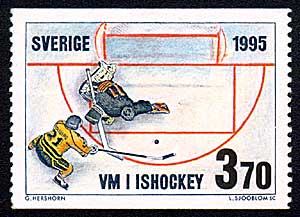The Forsberg factor versus Canada
Thursday, 16 August 2007

Originally published on IHWC.NET in 2004
By Lucas Aykroyd
Most hockey people will tell you that Peter Forsberg is the best forward, or even the best player overall in the world, when he’s healthy. The list of the Super Swede’s accomplishments is about as long as the journey from his native Ornskoldsvik to Denver, Colorado.
As a consummate team player, he’s won an Olympic gold medal (1994), two IIHF World Championships (1992, 1998) and two silver medals (1993, 2003), and two Stanley Cups with the Avalanche (1996, 2001). As a spectacular individual talent, he’s enjoyed innumerable all-star team selections at the Olympics and Worlds, as well as in the Swedish Elitserien and the NHL. In addition, Forsberg captured the 1994-95 Calder Trophy as the NHL’s rookie of the year, and the Art Ross Trophy as the NHL’s leading scorer and Hart Trophy as NHL MVP in 2003.
This is all well and good. But today, the only thing on Forsberg’s mind is beating Team Canada in the gold medal game at the 2004 IIHF World Championship in Prague. He wants revenge for Sweden’s loss in last year’s title game in Helsinki.
So how has Forsberg fared against Canada in senior IIHF competition? Basically, not as well as you might guess. He’s had two truly shining moments, but otherwise, the 186-cm, 96-kg center has frequently been overshadowed by his teammates in these encounters.
Since Canada was eliminated by Finland in the quarter-finals of the 1992 IIHF World Championship, Forsberg didn’t even get to face the Maple Leaf men in his first such tournament.
April 20, 1993 at the Worlds in Munich, Germany marked Forsberg’s senior debut against Canada, as Tre Kronor lost by a score of 4-1. The Canadian team was stacked with the likes of Eric Lindros, Paul Kariya, Mike Gartner, and Mark Recchi. While Forsberg was held off the scoresheet, he played well on a line with Jonas Bergqvist and Markus Naslund, and put one shot past Bill Ranford and off the inside of the goal post.
Many people have forgotten that Forsberg didn’t perform all that well in the 1994 Lillehammer Olympics. He was ineffective in a 3-2 round robin loss to Canada on February 21. The Swedish tabloid Expressen ran a story about him headlined “FLOPPA,” in a nasty pun on his nickname.
But in the gold medal game, Forsberg elevated his performance. First, he assisted on Magnus Svensson’s tying goal, which sent the game into overtime. When that settled nothing and the teams went to a game winning shots competition, he famously borrowed a move Kent Nilsson first used versus USA goalie John Vanbiesbrouck at the 1989 IIHF World Championship in Stockholm. Forsberg scored one-handed on Canada’s Corey Hirsch, and when Paul Kariya was foiled by Tommy Salo at the other end, Sweden had its first Olympic hockey gold ever.
In the 1996 World Cup, Forsberg was largely overshadowed by Toronto Maple Leaf center Mats Sundin. “I’m very satisfied with the play of Mats,” said Swedish Head Coach Kent Forsberg, Peter’s father. “He has been better than Peter.” Sundin was far more visible than Forsberg in Sweden’s 3-2 overtime loss to Canada in the tournament semi-finals. Tre Kronor finished in third place.
At the 1998 Nagano Olympics, Forsberg finished 16th in tournament scoring with a goal and four assists. He had little impact on the scoresheet in a 3-2 round-robin loss to Canada, apart from being sent off for slashing along with Al MacInnis.
A few months later, the gifted forward had his best game ever versus Canada at the IIHF World Championship in Switzerland. Forsberg’s two goals and four assists lifted the Swedes to a 7-1 victory over their nemesis. “We didn’t want to allow him to have that kind of freedom, that kind of room. When you give a guy like that that much room, you’re going to be in trouble,” Canadian forward Keith Primeau told reporters afterwards. Sweden went on to the gold medal, while Canada finished sixth.
Fast forward to 2003. In the final game between Canada and Sweden, Forsberg frequently dominated down low, carrying the puck wherever he pleased. But nothing came of it offensively. The pride of Ornskoldsvik was blanked by Canada’s “Grind Line” of Kris Draper, Kirk Maltby, and Shane Doan, and Canada earned its third gold medal since 1994 with a 3-2 win on Anson Carter’s OT goal.
Today, Forsberg has another chance to assert his status as the most dominant player in hockey.








